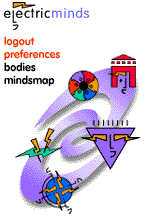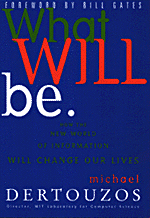
|

|

Electric Minds is proud to present excerpts from Michael Dertouzos's book What Will Be. In a 1975 People magazine interview, Michael Dertouzos predicted the existence of a PC in every 3-4 homes by the mid-1990s. In 1976, he steered MIT's Laboratory for Computer Science to distributed systems research. In What Will Be, he dispels much of the conventional hype about technology and its future, and offers his view of what 21st Century life will actually be like.  The Information Marketplace
The Information Marketplace
The industrial revolution began in England when the steam engine was invented in the middle of the eighteenth century. Soon railways and factories appeared, driven by these new mechanized horses. People left the farm for the city, where they would earn higher wages and could buy the improved and ample foodstuffs and clothing the new era provided. They also met with crowded, unsanitary conditions in their new quarters, however, and had to endure the abuses heaped upon laborers, especially women and children. Technical change had largely stopped by the end of the nineteenth century when a wave of innovations appeared: the internal combustion engine, electricity, synthetic chemicals, the automobile. The second industrial revolution, as it is often called, made food production possible with many fewer people and improved the production and transportation of goods. Earnings increased, and a new class of white-collar workers emerged. More people became better educated and had money for new services and luxuries. They also became much more mobile. Again, there was a dark side. Unemployment and social welfare problems appeared along with the huge wage imbalances between classes of workers. There was a surge toward materialism and a focus on the self and away from the tightly knit family. The Information Revolution will trigger a similarly sweeping transformation. The question is what physical and functional forms the Information Revolution will take. What will be its "factories," and what will its people and machines do?
Infrastructure Is the Key Despite the wonderment in the press, and the hype in phone and software companies' ads, the Information Marketplace's infrastructure is far from complete. To objectively test whether a true information infrastructure exists anywhere in the world today, let's check what's out there against the key properties of well-known infrastructures - the telephone network, the electric power grid, and the highway system. The most noticeable property of any infrastructure is its wide availability: there is a telephone and an electrical outlet within easy reach in every home and office, and a road is almost always waiting quietly right outside. Infrastructures are also easy to use: pick up the phone; plug in an appliance; get into your car and drive away. Infrastructures are readily scaleable: local phone networks, power lines and roads are connected to form regional phone networks, power grids, and highway systems, which are then connected to create larger national and international infrastructures. The most powerful property of a true infrastructure is that it makes possible numerous independent activities. The telephone infrastructure makes possible millions of conversations every day that span a wealth of different topics, from business transactions to love chats - not to mention fax and modem activity. The electric system powers thousands of different appliances, from steel-melting arc furnaces to kitchen can openers. The highway system allows motorcycles, cars, trucks, and buses to move anyone and anything anywhere. How do today's computer and communication systems fare against these key properties of traditional infrastructures? Computers are widely available, at least in the industrially rich nations. Communication services can also be easily purchased, although today's telephone networks cannot transmit data fast enough for some existing and many forthcoming applications; it would take a month to ship a full-length high-definition color movie through an ordinary telephone line! Information networks are scaleable. The famous Internet, which ties millions of computers and their users, has mushroomed to its current size by linking thousands of smaller computer networks. We'll say more about the Web and the Internet. Meanwhile, think of the Internet as a postal system for shipping raw information among the world's computers. And think of the Web as a specific way of using this system to view and visit information on distant sites by clicking your mouse. Unfortunately, computers and communications networks are not easy to use. The manual for a word processing program is as thick as a dictionary. Even telephones have become complicated inhuman, like the automated corporate answering systems that force us to suffer through tedious push-button choices before letting us talk to a real person - if at all. The most important property of an infrastructure -- the ability to make possible numerous independent activities -- is not met by today's information infrastructures either. Surely, individual computers do support many useful applications, from spreadsheets to computer-aided design. But they cannot perform easily thousands of different tasks over a network. My computer cannot find me the car with the greatest headroom, because different manufacturers keep their data in different forms and on different sites. This is the norm today. Different machines and different software packages use different rules. You must stand on your head and use all kinds of arcane mechanisms to make any sense out of them. Browsers and the Web don't help in this regard, because you end up doing an inordinate amount of work searching without any assurance as to the outcome. So we must objectively conclude that there is no true information infrastructure anywhere in the world today. As we cast this shockingly negative shadow on today's information systems, we should remember that we are only thirty years into the new technologies of information. It took more than a century to move the world from steam engine to internal combustion engine. Some patience with this young field is in order. Okay, so there is no true information infrastructure around. Surely someone is building it, right? Yes and no. The Web and the Internet are the right start, but as we shall see they are still a long way from being there. And the large corporate forces - the telephone, media, software, and hardware companies - are not helping. They naturally view the future as a place predominantly for their products and services. The infrastructure that ties all these participants together is of secondary interest to them. They each want to set up their stores along the highway, and they don't see it as their job to actually lay down the pavement. So where will the infrastructure come from? As we'll see, every one of these actors will have no choice but to contribute. The challenge before them, and the rest of us, is to get competitors to work in concert to build an infrastructure, rather than let it happen as it might. This could make a difference of a decade or more in the arrival of an Information Marketplace that provides real utility and opportunity.
Questions Trying to foresee the future uses of the Information Marketplace is as futile as Alexander Graham Bell's having dreamed that his invention would lead to answering machines, 900 numbers, phone sex, dial-a-prayer, faxes, and cellular phones (there was no such thing as a "car"!). Now, as was the case then, we can say with some confidence that the new technologies will profoundly affect every corner of our personal and professional lives. What we have trouble discerning is just how likely it is to happen. Nevertheless, that is what I intend to do. Some of what I predict will undoubtedly prove wrong, but I hope to identify some lasting patterns of tomorrow's Information Marketplace, along with its major promises and problems. Let's begin our journey with a list of questions the book will tackle. Ideally the Information Revolution will repeat the successes of the Industrial Revolution, except that this time brain work instead of muscle work will be offloaded onto machines. Is this going to happen, or are we going to be handed high-tech shovels, like today's Web, that force our eyes and brains to still do all the shoveling? Are we going to gain greater and faster access to needed information, along with a greater individualization of products and services, or will we drown in info-junk? What should software and hardware vendors of the twenty-first century offer to propel the Information Marketplace beyond its current medieval stage? Will computers increase the industrial performance of the world's nations, or is the help they offer irrelevant to that quest? What tools are likely to grow on these infrastructures for carrying out electronic commerce and groupwork? What will happen to employment? Will any economic activity remain unaffected? Will our way of life improve through cheaper, faster, and higher-quality health care and a greater access to knowledge? Or is better information a minor player in these quests? Will the rich who can sooner afford these technologies get richer? Will the poor be given new leverage, or will they just be left further behind? What new software will flourish in the Information Marketplace? Which programs will be used in everyday life, and which will be reserved for specialized situations? What new gadgetry and interfaces might appear, and how will use them? How close to the real world can we get with goggles, tactile bodynets, virtual "feelies" and "smellies"? As greatly enhanced entertainment comes to our living rooms, will we derive greater enjoyment or become lazier couch potatoes? Will we surrender physical human interactions to the artificial virtual-reality cocoon? Will people benefit by preexperiencing future vacation spots, or will they become jaded by all this foreknowledge and lose the pleasure of discovery of an adventure into the unknown? What kinds of battles will be fought as everyone rushes to profit from the place? Who will be the winners and losers? How will the infrastructure look when these battles are over? Will ordinary citizens be better heard by their governments, or are electronic town halls impossible to achieve? Will our privacy be assured on the world's information marketplaces, or will Big Brother end up knowing more about all of us? Should we change laws to protect ourselves from this new technology? If so, how? How might war and peace be affected? And what of human relationships? Will they become stronger, rooted in the Information Marketplace's rich global embrace, or will they become more transient and fickle? With all the people of this world only a few mouse clicks away, will a universal culture emerge to bind us together, or will this increase in proximity cause overcrowding, fights with our new neighbors, and the rise of info-predators and info-crime? Ultimately, we want to know what human qualities pass and do not pass through the Information Marketplace; can we love or hate over a computer network, or will these forces of the cave only be possible as we stand face-to-face before our friends and adversaries? Join the discussion of "What Will Be" in the Tomorrow Conference!
|
librarybob said: I think it would be useful to distinguish between "innate ability" and "the result after many years of acculturation and schooling" to define "dumb". I wouldn't think it likely that there has been an innate (genetic) change, so that if people have indeed been dumbed down, it must be due to environmental causes. Actually, maybe "dumbed down" isn't quite right--maybe very committed to "low" and "mid" culture that really doesn't demand much thinking. A problem I see is that both of these are "ahistoric," living in the here and now with little sense of a past and little sense of a future. They lack a larger context. Most Active Topics: Topic 45 The Future of Families Topic 42 Library of Tomorrow: 20 Questions (game) | |||
|
About the Author Michael Dertouzos was born in Athens, Greece, and received a Ph.D. from MIT in 1964. He is the director of MIT's Laboratory for Computer Science. He has spent much of his career studying and forecasting future technological shifts. During the Carter administration, he chaired a White House advisory group that redesigned the White House Information Systems. In February 1995, he represented the United States as a delegate to the G7 Conference. Currently he is advisor to the Clinton/Gore team on information infrastructure.
The most important property of an infrastructure -- the ability to make possible numerous independent activities -- is not met by today's information infrastructures. We must objectively conclude that there is no true information infrastructure anywhere in the world today. As we cast this shockingly negative shadow on today's information systems, we should remember that we are only thirty years into the new technologies of information. Some patience with this young field is in order. Ideally the Information Revolution will repeat the successes of the Industrial Revolution, except that this time brain work instead of muscle work will be offloaded onto machines. Is this going to happen, or are we going to be handed high-tech shovels, like today's Web, that force our eyes and brains to still do all the shoveling? Will human relationships become stronger, rooted in the Information Marketplace's rich global embrace, or will they become more transient and fickle? With all the people of this world only a few mouse clicks away, will a universal culture emerge to bind us together, or will this increase in proximity cause overcrowding, fights with our new neighbors, and the rise of info-predators and info-crime? | ||||
Also in Howard Rheingold's Tomorrow: Collaborative Filtering excerpts from "What Will Be" Digital Maps: | ||||
|
|


